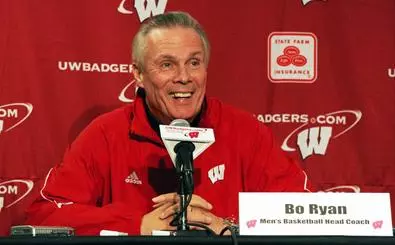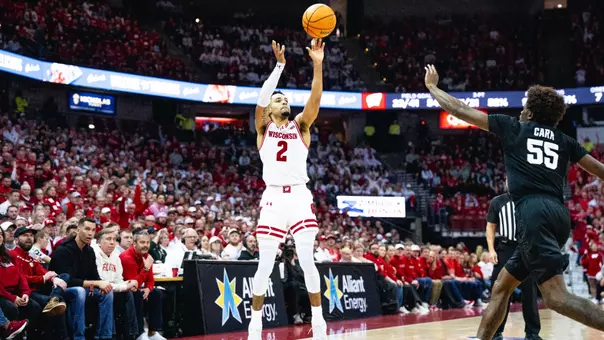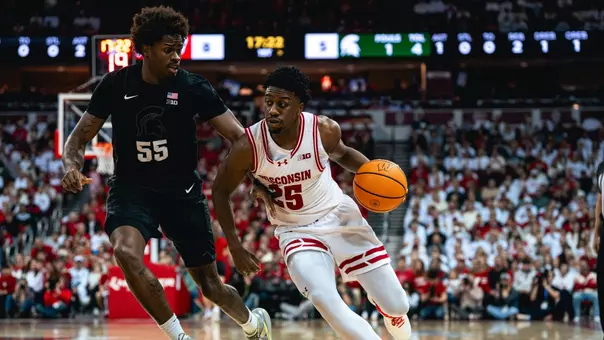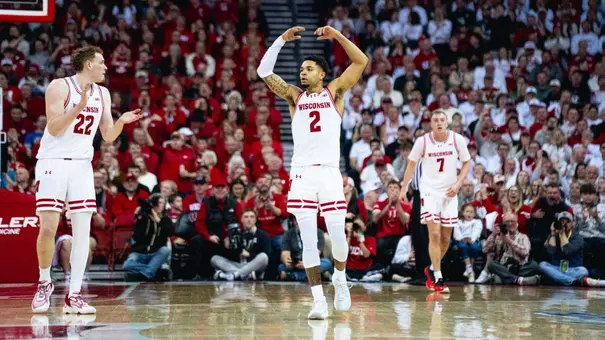
Coach Ryan talks with the media
December 22, 2008 | Men's Basketball
Coming off a win over Coppin State and heading into a big match-up with Texas on Tuesday, head coach Bo Ryan spoke with reporters at his weekly press conference on Monday. Among other things, Ryan discussed last year's thrilling win over Texas, Coolio and secret languages used on the court The full transcription can be found below but it's also worth watching on the mid=2847"> --> archived stream.
PATRICK HERB: The Wisconsin's men 's basketball team is 9-2 coming off a 57-46 win over Coppin State on Saturday. On Tuesday, the men's team will face number five Texas. The Wisconsin Badgers are 15-4 at home versus ranked teams under Coach Ryan and they have another such game on Tuesday. We'll have a couple opening words about Coppin State or Texas and then we 'll take questions.
BO RYAN: Well, I think our guys got some things back from finals time when they competed against Coppin State. And what was good is you played a team that played a lot of different types of defenses and tried and used different things on us, so it forced our guys to read and react. So I thought that was the good part of getting a team like that in here. With Texas, obviously, they come in with credentials that everybody is more familiar with, having played on national TV, a lot of exposure, a lot of players in the potential All-American caliber. So I think Texas is a team everybody is familiar with, and we're anxious to see where we stand at this point, knowing that we still have a lot to learn.
QUESTION #1: Bo, a couple things. One, I know a lot of times when you schedule these games, the date actually kind of depends on when the Kohl Center is open and both teams are available, but with Texas, was this game scheduled purposely late in the non-conference season so it would maybe give you a little chance to see where you're at going into Big 10 play'
RYAN: I wish I had some material for you, Mark, but I don't have any material for you. It wasn't purposely anything. It 's just that's the way it plays out sometimes. There are a lot of factors.
QUESTION #2: And then also you've got four guys, Joe (Krabbenhoft) and Marcus (Landry) and Trevon (Hughes) and Jason (Bohannon), who have been in these type of games, these type of situations a lot. Where in your experience does that experience show up, you know, when you have those four guys like that, in games like this, where does that experience show up the most, do you think'
RYAN: Well, I think those four guys, you know, you mentioned this type of game, you have to be ready to play every game. You have to be ready to come to practice every day. So what experience says when you mention four guys that have been in these types of games, number one, it means they've been around. It means they've been consistent. They've stayed the course.
So what happens is, is what they're hoping for is to be able to play a consistent game, to play using the things they've learned to this point. That's how you compete, but you don't just get ready for a game because a team is ranked really high or do things differently because you're playing a ranked team. They 'll get ready the same way they get ready for other games and the way they get ready for practice.
That's one of the things we try to teach, and that's one of things as a teacher and a coach I'm always talking about, come ready every day. It's one day at a time, all the cliches they can hear, but you have to live it. So I try to do my part, come to practice the same way every day with the idea that, okay, what can we do today to get better. So all right, who are we playing next' Let's just keep building.
QUESTION #3: Bo, what would you say you guys, you maybe learned last year with the Texas win'
RYAN: Well, I never read too much into one on the left side or too much into one on the right side. That game had a lot of changes where a couple times Texas looked like they were going to run away with it, and then we just clawed our way back, got contributions from a lot of different people at different times. We were very opportunistic. The heroics at the end by Michael (Flowers), who is back in town, by the way, was at practice last night, you know, a lot goes to when they talk about the Texas game and being one of the best non-conference wins for the Big Ten, etc., etc. Well, the Big Ten has had plenty of non-conference wins this year that looked pretty good. So I think it was the last game before Big Ten, we go into the Big Ten and win it, so you always look back and say, okay, did that Texas win do this, this, or this' I don't know.
We don't go to the next practice after a game and say, oh, because we won this one or because we lost this one, this is what's going to happen down the road. It 's all subjective. But we don't, we just try to look at that game last year and say that was a good win, and then you move on. I mean, you don't have much time to celebrate. You don't much time to spend a lot of time in conversation on it.
QUESTION #4: How well does this team listen '
RYAN: Well, they listen. I don't know if there's a scale. Show me a scale, 1 to 10.
QUESTION #4: Yeah, but you can tell by how well they take what you tell them and learn from it and incorporate it into their games. You know, is this team, do you like this team for . . .
RYAN: They listen. But the thing is, you never know physically or mentally what somebody can do unless you keep driving things home and pushing points. So I've never tried to allow players to be here and get cheated out of trying to get better. Now when you say, do they listen, if somebody doesn't happen to get better in a hurry, or if it takes somebody a little longer, it doesn 't mean they're not listening. Maybe they don't have the ability yet. Maybe they're not quite ready. So basically, in the words of Coolio, again, `See ya when you get there'. They laughed at me in Milwaukee when I used that quote. Mark, do you remember when I used that one' They were like Coach Ryan 's quoting Coolio'
QUESTION #5: Going back to last year's game for a second, there are stories about what other famous sort of buzzer-beating shots happening ' What did you say to your team in the timeout before and what were your emotions as you watched the play unfold and see what happens'
RYAN: Well, you've been around, you 've seen me, I don't get wacky. It's real simple. What we ran against them, and then later what we ran against Purdue was a read on how they handled the screen. It wasn't, you notice I don't carry a clipboard over on the side. I don't, and the reason I don't is couple times when the camera zoomed in on coaches, and if you saw the lines and the circles and the mess that was on those clipboards, I have no idea how those young men walked out of that huddle knowing what the heck they were going to do.
So what we do is we practice those situations, and then with our, with the vernacular that we use, okay, rub high, ball screen here, stagger there, do this one, this one, this is how much time we have. So in the huddle, when I'm talking, I'm not diagramming things. We've already done that. And plus sometimes you get over there, and by the time you're done shh, shh, shh, all that, the guys are walking out. If you ever watch them, they'll say to the player, well, what am I doing on that play' Am I screening for you or are you'
So we end up doing those situations in practice, and we try to use in a game what we 've done in practice. Now if a team takes that away, you don't know if the team is going to go to zone, to a match-up, from man to start out in a zone and then go man. So there's certain things that you have to do to prepare for that.
Did we believe we could do it' Absolutely. You don't ever go into those situations without believing that it's going to happen. It's one of those things where when you read about, I think it was in (Stephen R.) Covey's book, Seven Habits of Highly Effective People, when we're kids, get them to dream about going to the line for 1-1 with no time on the clock. When you're 10 years old, you never miss the 1-1. Ask a 10-year-old, they never. You ask a 30-year-old, you're down, you got fouled . . . oh, man, those are tough, because things happen to them where they didn't make it or as they grew older, they lost some self-confidence. And they go, not everybody when they're 30 is thinking when they're daydreaming that they make that 1-1.
Every kid, I always got the hit with two outs, or if the ball was hit to me, I always fielded it and threw the guy out. I always threw the touchdown pass or caught the touchdown pass, or in basketball made the shot, as a kid. So what I want to do is, with these young men, is keep that positive train of thought going. This is what we're going to do. I'll never forget Alando Tucker's reaction after we won the Tulsa game. And he said, `Coach, you said exactly what we were going to do with three minutes and something to go'. Well, later on, after he graduated, I said, `Hey, even a broken clock is right twice a day, Alando'. But he actually believed.
And then the Michigan State game last year, stop the clock, if we get fouled, we do this, we do this, we do this, and then, sure enough, Marcus was interviewed. And if you heard what Marcus said, he listens. Only Marcus never said that that's what coach said in the huddle. I didn't get any love from Marcus on that one, but I don't need it. They need it. They're the ones playing. But everything that we talked about, you can ask every guy that was in that huddle against Michigan State last year, down 12, what we said we needed to do, and those guys, our guys did it.
So what do I say over there' There's no secret language. Kind of interesting. Anybody see that story on Bill Bradley, how him and some of his teammates had this secret language that they would use on the court. It was pretty neat. You can look it up I guess. But it would go . . . and Lucas would say to Bradley . . . and the other guys would look at them and go what the heck are they doing. And I can see somebody doing that now and spelling what I just said. Anyhow, you got to read that, because I took Bill Bradley's number in high school. It was amazing that a high school had 42 that fit 160-pound guard, 6'0 guard. I got to college, but 42 didn't. I had to go smaller.
QUESTION #6: We've addressed shooting slumps many times over the years, but when you have a couple freshmen that are struggling a little bit, do you say anything to them at the time, if you like their mechanics' Do you just leave it alone'
RYAN: With freshmen you keep them loose. Rob (Wilson) made a tough pass into Marcus (Landry) from the wing and threw it out of bounds. Right after that, I don't know if you remember, but he stumbled. Well, what happened was when Andy (North) ordered the new floor, this is the second of the new courts, as I played it in the locker room for the players, much to all of our amusement, as he trips, I said, `Rob, here's what you didn't know, Andy ordered two coats of paint on the three-point line. That's why you tripped'. Keep them loose.
Jordan (Taylor) hits like two in a row yesterday on the scout team, and I just said something about maybe I'll let you wear the scout team shirt when you play tomorrow. You know, it's different when you're on the scout team. You can go out there and just relax and play. You're going to be fine. I don't obsess with guys, never have, never will.
But they're not the only ones that go through periods like that. And having played baseball, I think that helps me as a coach. It's tough to consistently get one or two hits a game. You can have three or four games of 0-fers and come back and go 4-5, 3-4 in the doubleheader. You know, you just have to keep playing, keep competing, work on mechanics in practice. Same things all the other athletes do in every sport, but play hard on defense, get loose balls, rebound, and you'll always have a chance to compete.
QUESTION #7: Did you DVR that Texas/Michigan State game, what did you think, and you were talking about your scout team, who plays (A.J.) Abrams on your scout team'
RYAN: What's a DVR'
QUESTION #7: Did you videotape it'
RYAN: DVD it'
QUESTION #7: DVD it.
RYAN: Yeah, we have, I mean, we take out clips from every game that we play. But you know, we don't, oh, this was last year, this is what we did. Players are interested in, okay, what are we going to do now. They don 't want to live in the past. They're in the present. That's where we keep it.
Oh, versus Michigan State' I thought you meant our game last year. Oh, okay. Yeah, we'll have some clips. We have some clips on our scout tape from that that they'll take some notes from today. Scout team ran some of the things that they did against Michigan State and against Villanova and against everybody else that they 've played. It's kind of hard to put the same kind of athletes out there on the floor, but it is what it is.
QUESTION #8: Having played Marquette and the guards like (Wesley) Matthews and (Dominic) James . . . does that get your guys ready at all to guard Abrams on Tuesday'
RYAN: Well, James would be sort of like him, but (Jerel) McNeal and the guards from Connecticut, I mean, the guards from Connecticut were pretty good. (Kemba) Walker comes in off the bench, and he could start for any team in the country. So you know, we've played some good guards, and we'll play good guards in the Big Ten, and we've played them in the past, and what we always like to, always come back with is then they got to play us too. You know, they got to handle our guards and our forwards and our center. Abrams can play. We played him last year, and we 've played other guards like him. But to say that one team better prepares you for, I can't say that because they're all different. Some are bigger, some are quicker, some are more of a threat to drive, some are more of an outside threat, but he can do it all.













